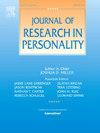Personality functioning across clinical and nonclinical models: further evidence for conceptual convergence between different traditions and the status of personality functioning as a competence construct
IF 3.1
2区 心理学
Q2 PSYCHOLOGY, SOCIAL
引用次数: 0
Abstract
Personality functioning (PF) is the central criterion for personality pathology in clinical models. Nonclinical personality models assume emotional intelligence or the general factor of personality as general indicators of adaptiveness. Both are conceptualized as more competence-like than solely trait-like. It has rarely been investigated (1) whether these constructs might assess the same latent dimension, and (2) if they indeed reflect competencies beyond traits. In three samples (N = 592), we observed (1) high convergence between all constructs. (2) PF was related to a full-scale emotional competence performance measure (Mayer-Salovey-Caruso Emotional Intelligence Test), supporting its status as a competence construct. (3) Further, all constructs are strongly saturated with PF variance, and PF can be reliably estimated from common personality scales.
跨临床和非临床模型的人格功能:不同传统和人格功能作为能力结构之间概念趋同的进一步证据
人格功能(PF)是临床模型中人格病理学的中心标准。非临床人格模型假设情绪智力或人格的一般因素作为适应性的一般指标。两者都被概念化为更像能力,而不仅仅是像特质。很少有人研究(1)这些构式是否可能评估相同的潜在维度,以及(2)它们是否确实反映了特质之外的能力。在三个样本(N = 592)中,我们观察到(1)所有结构之间的高度收敛。(2)人格特质与全量表情绪能力绩效测量(Mayer-Salovey-Caruso情绪智力测验)相关,支持其作为能力建构的地位。(3)此外,所有构念都具有强烈饱和的PF方差,并且可以可靠地从通用人格量表中估计PF。
本文章由计算机程序翻译,如有差异,请以英文原文为准。
求助全文
约1分钟内获得全文
求助全文
来源期刊

Journal of Research in Personality
PSYCHOLOGY, SOCIAL-
CiteScore
5.40
自引率
6.10%
发文量
102
审稿时长
67 days
期刊介绍:
Emphasizing experimental and descriptive research, the Journal of Research in Personality presents articles that examine important issues in the field of personality and in related fields basic to the understanding of personality. The subject matter includes treatments of genetic, physiological, motivational, learning, perceptual, cognitive, and social processes of both normal and abnormal kinds in human and animal subjects. Features: • Papers that present integrated sets of studies that address significant theoretical issues relating to personality. • Theoretical papers and critical reviews of current experimental and methodological interest. • Single, well-designed studies of an innovative nature. • Brief reports, including replication or null result studies of previously reported findings, or a well-designed studies addressing questions of limited scope.
 求助内容:
求助内容: 应助结果提醒方式:
应助结果提醒方式:


